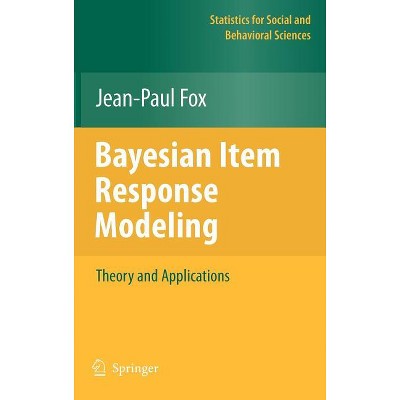Explanatory Item Response Models - (Statistics for Social and Behavioral Sciences) by Paul de Boeck & Mark Wilson (Paperback)

About this item
Highlights
- This edited volume gives a new and integrated introduction to item response models (predominantly used in measurement applications in psychology, education, and other social science areas) from the viewpoint of the statistical theory of generalized linear and nonlinear mixed models.
- Author(s): Paul de Boeck & Mark Wilson
- 382 Pages
- Mathematics, Probability & Statistics
- Series Name: Statistics for Social and Behavioral Sciences
Description
Book Synopsis
This edited volume gives a new and integrated introduction to item response models (predominantly used in measurement applications in psychology, education, and other social science areas) from the viewpoint of the statistical theory of generalized linear and nonlinear mixed models. Moreover, this new framework allows the domain of item response models to be co-ordinated and broadened to emphasize their explanatory uses beyond their standard descriptive uses.
The basic explanatory principle is that item responses can be modelled as a function of predictors of various kinds. The predictors can be (a) characteristics of items, of persons, and of combinations of persons and items; they can be (b) observed or latent (of either items or persons); and they can be (c) latent continuous or latent categorical. Thus, a broad range of models is generated, including a wide range of extant item response models as well as some new ones. Within this range, models with explanatory predictors are given special attention in this book, but we also discuss descriptive models. Note that the "item responses" that we are referring to are not just the traditional "test data," but are broadly conceived as categorical data from a repeated observations design. Hence, data from studies with repeated observations experimental designs, or with longitudinal designs, may also be modelled.
The book starts with a four-chapter section containing an introduction to the framework. The remaining chapters describe models for ordered-category data, multilevel models, models for differential item functioning, multidimensional models, models for local item dependency, and mixture models. It also includes a chapter on the statistical background and one on useful software. In order to make the task easier for the reader, a unified approach to notation and model description is followed throughout the chapters, and a single data set is used in most examples to make it easier to see how the many modelsare related. For all major examples, computer commands from the SAS package are provided which can be used to estimate the results for each model. In addition, sample commands are provided for other major computer packages.
Paul De Boeck is Professor of Psychology at K.U. Leuven (Belgium), and Mark Wilson is Professor of Education at UC Berkeley (USA). They are also co-editors (along with Pamela Moss) of a new journal entitled Measurement: Interdisciplinary Research and Perspectives. The chapter authors are members of a collaborative group of psychometricians and statisticians centered on K.U. Leuven and UC Berkeley.
From the Back Cover
This edited volume gives a new and integrated introduction to item response models (predominantly used in measurement applications in psychology, education, and other social science areas) from the viewpoint of the statistical theory of generalized linear and nonlinear mixed models. The new framework allows the domain of item response models to be co-ordinated and broadened to emphasize their explanatory uses beyond their standard descriptive uses.
The basic explanatory principle is that item responses can be modeled as a function of predictors of various kinds. The predictors can be (a) characteristics of items, of persons, and of combinations of persons and items; (b) observed or latent (of either items or persons); and they can be (c) latent continuous or latent categorical. In this way a broad range of models is generated, including a wide range of extant item response models as well as some new ones. Within this range, models with explanatory predictors are given special attention in this book, but we also discuss descriptive models. Note that the term "item responses" does not just refer to the traditional "test data," but are broadly conceived as categorical data from a repeated observations design. Hence, data from studies with repeated observations experimental designs, or with longitudinal designs, may also be modelled.
Paul De Boeck is Professor of Psychology at K.U. Leuven (Belgium), and Mark Wilson is Professor of Education at UC Berkeley (USA). They are also co-editors (along with Pamela Moss) of a new journal entitled Measurement: Interdisciplinary Research and Perspectives. The chapter authors are members of a collaborative group of psychometricians and statisticians centered on K.U. Leuven and UC Berkeley.
Review Quotes
From the reviews:
"[It is] full of nice features to make it widely useable by practitioners and applied statisticians alike, and it does a wonderful job connecting psychometrics to the field of statisitcs." Deniz Senturk for Technometrics, November 2006
"This book seeks to generalize the typical perspective on item response models, putting the ideas into a broader statistical context. ... The authors have made a good job of integrating the various contributions, and I believe the book will help in increasing awareness of the potential of these types of models." (D.J.Hand, Short Book Reviews Publication of the International Statistical Institute, Vol. 25 (1), 2005)
"This edited book, with 20 contributors, gives an integrated introduction to various item response theory models ... . Each chapter is provided with helpful software, discussion and exercises. ... all chapters are well prepared and the book seems to be extremely well edited. ... this book presents state-of-the-art models and techniques ... . will be an essential text for advanced graduate students in psychometrics and applied statistics as well as researchers in testing fields. All libraries of research universities should have copies of this book." (Seock-Ho Kim, Journal of Applied Statistics, Vol. 33 (5), June, 2006)
"The general focus ... is to provide an integrative framework for the disparate set of models existing in psychometrics, econometrics, biometrics, and statistics. ... EIRM, as is clearly advertised in the title of the book, deals with models that fit in the IRT framework. ... The wealth of citations to be found in the book means that its purpose as a reference is served. ... could be used in its entirety as a seminar for advanced students in statistics, biostatistics, quantitative psychology, or educational measurement." (Jay Verkuilen, Psychometrika, Vol. 71 (2), 2006)
Shipping details
Return details
Trending Poetry











